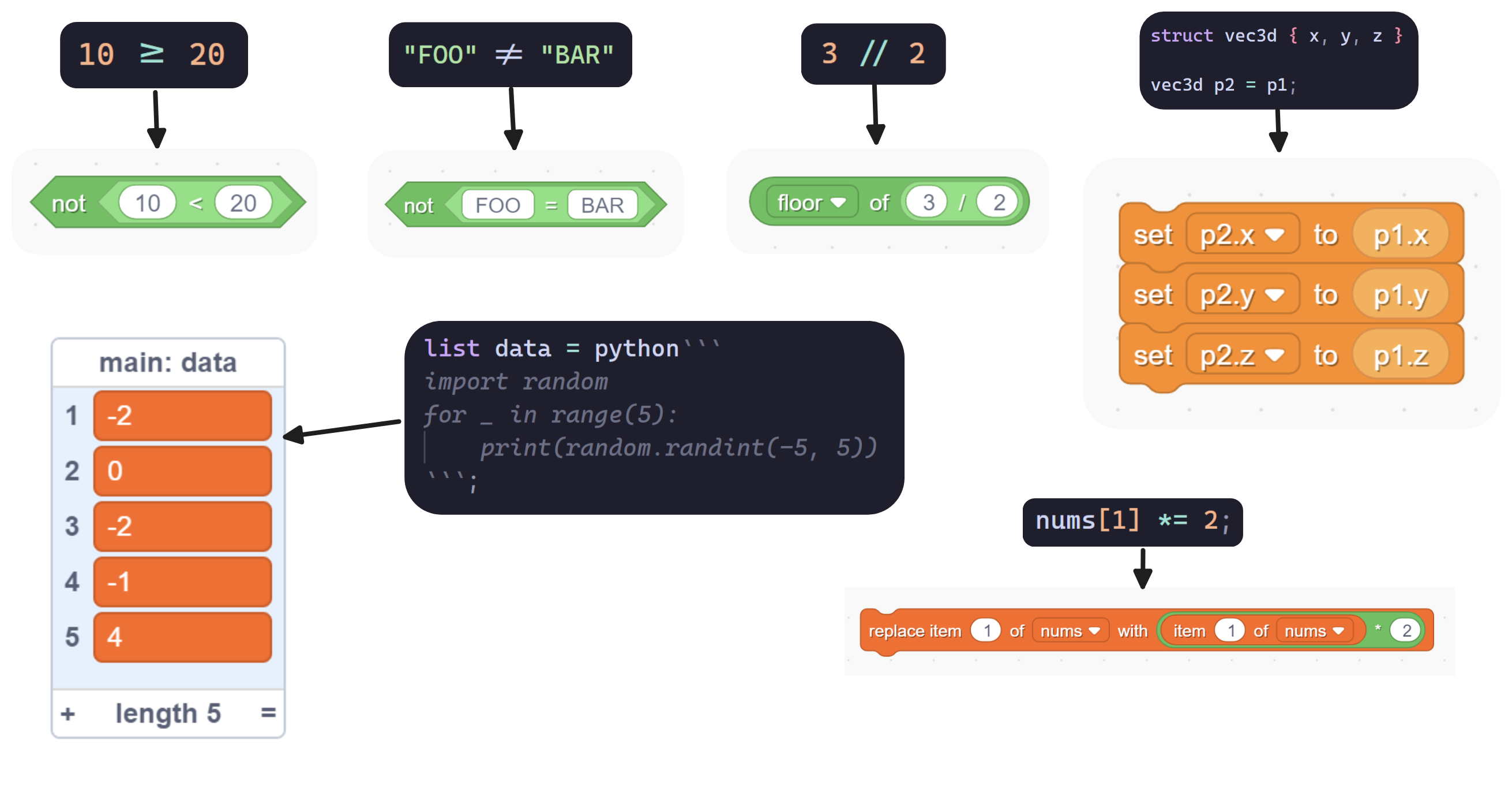★ Star the repo to support the project!
Installation and documentation
goboscript is a text-based programming language that compiles to Scratch. Write
Scratch projects in text, and compile it into a .sb3 file -- which can be opened
in the Scratch editor, TurboWarp or be uploaded to the Scratch website.
goboscript makes developing advanced Scratch projects FAST. goboscript syntax is concise and easy to read. Use a version-control system such as git. Use VS Code or your favourite text-editor. Share code by copy-pasting. Use the standard library. Refactor code using search and replace. Write scripts in other programming languages to generate goboscript code. goboscript allows you to integrate external tooling and workflows, such as using a script to generate costumes for a text rendering engine, or loading in images into lists. goboscript has a powerful macro system similar to C. The standard library includes many macros for frequently used patterns, such as converting R, G, B values into a single integer. goboscript performs optimization, removes unused code, and detects problems & mistakes.
goboscript is more than just an 1:1 mapping of Scratch blocks to text, it has abstractions such as:
- Custom data-types using Structs and Enums.
- Functions that return values
- Default parameters for Functions & Procedures
- Operators such as:
!=,>=,<=,//(Floor division),not in - Local variables (Function-scoped)
- and more...
All these abstractions are compiled down to regular Scratch code.
- std: The goboscript standard library.
- backpack: Package manager for goboscript.
- sb2gs: Decompile Scratch projects (.sb3) into goboscript projects (.gs)
- goboscript.ide: Online IDE for goboscript, runs projects instantly in the browser.
For a complete list of all text-based scratch projects, see https://scratch.mit.edu/discuss/topic/792714/
@retr0id first presented the demoscene discord with his boiga project (1). boiga works by
exporting Python data structures which nicely represent Scratch code in the form of
Python code. Soon after, I created my own re-implementation of boiga called gobomatic.
gobomatic was more feature-complete and supported more Scratch blocks and features than
boiga did, and it had some syntactical differences. The python version of goboscript
used gobomatic as a dependency to generate Scratch projects. Now, gobomatic is abandoned
and goboscript was ported to Rust.
(1): https://github.com/DavidBuchanan314/boiga
goboscript welcomes contributions in the form of Pull Requests. No LLM generated code will be accepted.
goboscript is written in Rust. You'll need to install the Rust toolchain for development.
Note
To install goboscript, follow instructions at https://aspizu.github.io/goboscript/install/ These instructions are for people who want to develop goboscript itself.
git clone https://github.com/aspizu/goboscript
cd goboscriptAfter cloning the repository, run goboscript locally from the repository root with:
cargo run -- build your_project/But, to make development easier, and to validate the generated Scratch project - use
the tools/run script:
tools/run compileThis assumes that you have set-up a testing project at playground/.
It will compile the project, validate it using the schemas from scratch-parser.
If the validation fails, Scratch will refuse to load the project. To further debug
the project, the generated project.json file is extracted from the .sb3 file in the
playground/ directory.
Lets say that you modified the generated project in the Scratch editor or Turbowarp,
and you want to look at the project.json. You can extract it with:
tools/run uncompileLets say that goboscript produced a broken project, and you are able to fix it by hand -
by modifying the project.json. You can add back the project.json to the .sb3 file
with:
tools/run patchIf you want to validate some .sb3 file, use:
tools/run check path/to/project.sb3goboscript was one of the first-place winners of FOSS HACK 25, and was awarded a 50,000 Rs. prize. FOSS HACK 25 was a open-source hackathon conducted on 22nd - 23rd February 2025 by the FOSS United Foundation. During the 48-hour hackathon, I had worked on several goboscript issues and feature implementation. Thank you FOSS United for the platform and opportunity.



